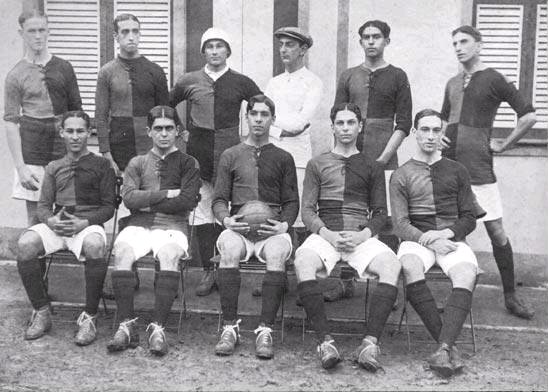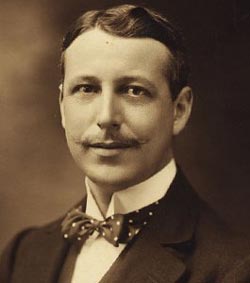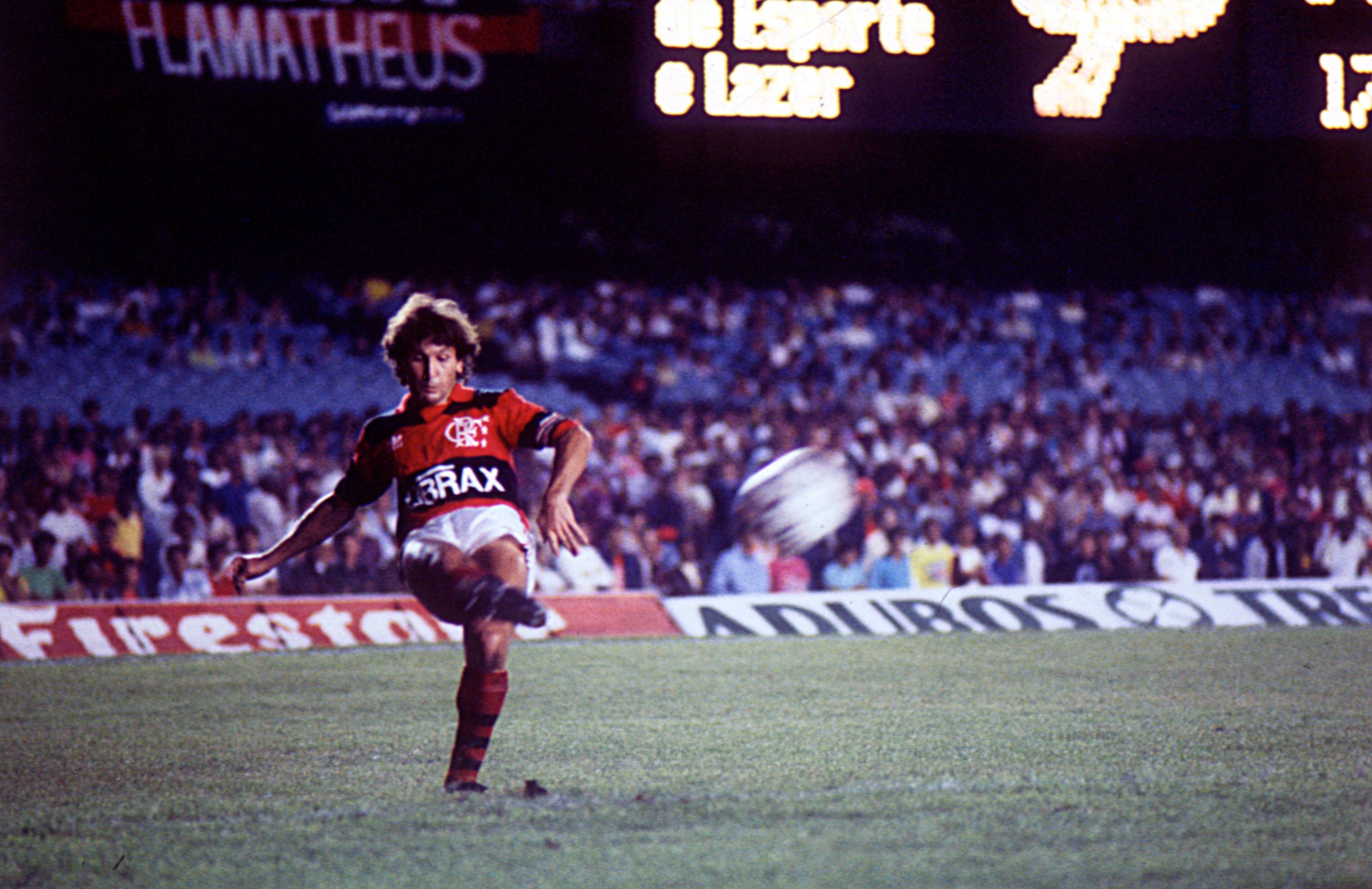|
1982 Campeonato Carioca
The 1982 edition of the Campeonato Carioca kicked off on July 17, 1982 and ended on December 5, 1982. It is the official tournament organized by FFERJ (Federação de Futebol do Estado do Rio de Janeiro, or Rio de Janeiro State Football Federation. Only clubs based in the Rio de Janeiro State are allowed to play. Twelve teams contested this edition. Vasco da Gama won the title for the 15th time. Madureira and Portuguesa were relegated. System The tournament would be divided in three stages: * Taça Guanabara: The twelve teams all played in a single round-robin format against each other. The champions qualified to the Final phase. * Taça Rio Taça Rio, or Rio Trophy, is an annual Rio de Janeiro football tournament. It is the second stage competition of the Campeonato Carioca, the state football championship in Rio de Janeiro. It has been organized since 1982 by the Rio de Janeiro St ...: The twelve teams all played in a single round-robin format against each other. The ch ... [...More Info...] [...Related Items...] OR: [Wikipedia] [Google] [Baidu] |
Campeonato Carioca
The Campeonato Carioca (Carioca Championship), officially known as Campeonato Estadual do Rio de Janeiro (Port., Rio de Janeiro State Championship), was started in 1906 and is the annual football championship in the state of Rio de Janeiro, Brazil. It is under the authority of the FERJ or FFERJ (Football Federation of the State of Rio de Janeiro). The first season of the ''Campeonato Carioca'' was played in 1906. It was predated by: the Campeonato Paulista of São Paulo and the Campeonato Baiano of Bahia. Rivalries amongst four of the most prestigious Brazilian teams (Botafogo, Flamengo, Fluminense and Vasco da Gama) have marked the history of the competition. The oldest clubs from Rio de Janeiro ( America, Botafogo, Flamengo, Fluminense, São Cristóvão, Vasco da Gama) had inspired the creation of many clubs from other states. Fluminense is the team considered the "champion of the century" with the highest number of titles of the 20th century at 28. Flamengo leads the ... [...More Info...] [...Related Items...] OR: [Wikipedia] [Google] [Baidu] |
Bangu Atlético Clube
Bangu Atlético Clube, commonly known as Bangu, is a Brazilian professional association football club based in Rio de Janeiro, in the western neighbourhood of Bangu. The team plays in Série D, the fourth tier of the Brazilian football league system, as well as in the Campeonato Carioca, the top tier of the Rio de Janeiro state football league. The club competed in the Campeonato Brasileiro Série A several times, finishing as runner-up in 1985. Their home stadium is the Estadio Moça Bonita, which has a capacity of 15,000. History The club has its origins in Fábrica Bangu (Bangu Factory), located in Bangu neighborhood, Rio de Janeiro. Some Britons that worked at the factory, especially Thomas Donohoe, introduced football to the factory workers by bringing footballs to the place and organizing the first football match in Brazil. In December 1903, Andrew Procter suggested the foundation of a club, when he realized how enthusiastic his colleagues were for football. The ... [...More Info...] [...Related Items...] OR: [Wikipedia] [Google] [Baidu] |
Taça Rio
Taça Rio, or Rio Trophy, is an annual Rio de Janeiro football tournament. It is the second stage competition of the Campeonato Carioca, the state football championship in Rio de Janeiro. It has been organized since 1982 by the Rio de Janeiro State Football Federation. Vasco da Gama is the most successful club in the tournament's history, having won the title eleven times. Format Sixteen teams of the competition are divided into the two same groups of Taça Guanabara, which is previously held. However, unlike Taça Guanabara, each team of Taça Rio play against every team of the other group, rather than teams of the same group, once. The top team from each group play against the second team of the other group in the semi-finals in a single match, with the winner qualified for the final of the competition. The winner of Taça Rio plays against the winner of Taça Guanabara in the Campeonato Carioca Final. History Taça Rio was created in 1982, as an equivalent to Taça Guanabar ... [...More Info...] [...Related Items...] OR: [Wikipedia] [Google] [Baidu] |
Taça Guanabara
The Taça Guanabara, or Guanabara Cup, is a football tournament organized annually since 1965 by the Rio de Janeiro State Football Federation. In its first four editions (1965, 1966, 1967 and 1968), the Taça Guanabara was a tournament in its own right, unrelated to the Rio de Janeiro league, and the winner would represent Rio de Janeiro in the Taça Brasil de Futebol national league competition. From 1969 onward, the cup became the first round of the Rio de Janeiro state league. Since 1982, the winners of the Taça Guanabara would play the winners of the Taça Rio in the Rio de Janeiro state championship final, with the exceptions of 1994 and 1995. The most successful team in the tournament's history is Flamengo, who have won 23 times. Current format Sixteen teams qualified from the state of Rio de Janeiro are divided into two groups of eight teams. The traditional "Big Four" teams in the state, Botafogo, Flamengo, Fluminense and Vasco da Gama, are seeded. Two of the four ... [...More Info...] [...Related Items...] OR: [Wikipedia] [Google] [Baidu] |
Rio De Janeiro (state)
Rio de Janeiro () is one of the 27 federative units of Brazil. It has the second largest economy of Brazil, with the largest being that of the state of São Paulo. The state, which has 8.2% of the Brazilian population, is responsible for 9.2% of the Brazilian GDP. The state of Rio de Janeiro is located within the Brazilian geopolitical region classified as the Southeast (assigned by IBGE). Rio de Janeiro shares borders with all the other states in the same Southeast macroregion: Minas Gerais ( N and NW), Espírito Santo ( NE) and São Paulo ( SW). It is bounded on the east and south by the South Atlantic Ocean. Rio de Janeiro has an area of . Its capital is the city of Rio de Janeiro, which was the capital of the Portuguese Colony of Brazil from 1763 to 1815, of the following United Kingdom of Portugal, Brazil and the Algarves from 1815 to 1822, and of later independent Brazil as a kingdom and republic from 1822 to 1960. The state's 22 largest cities are Rio de Janeiro, São G ... [...More Info...] [...Related Items...] OR: [Wikipedia] [Google] [Baidu] |
Federação De Futebol Do Estado Do Rio De Janeiro
The Federação de Futebol do Estado do Rio de Janeiro ( en, Football Federation of the State of Rio de Janeiro), usually known by the acronyms FERJ and FFERJ, manages all the official football tournaments within the state of Rio de Janeiro including the Campeonato Carioca, the Campeonato Carioca Série B1, the Copa Rio, and the Campeonato Carioca de Futebol Feminino. It was founded in 1978. History On March 15, 1975, the states of Guanabara, which consisted essentially only of the city of Rio de Janeiro and until 1960 the federal capital district of Brasil, and Rio de Janeiro, the non-metropolitan area of the state of Rio de Janeiro were merged into the current State of Rio de Janeiro. On September 29, 1978, the ''Federação de Futebol do Estado do Rio de Janeiro'' was founded by the merger of the ''Federação Carioca de Futebol'' (Carioca Football Federation, FCF) in the state of Guanabara and the ''Federação Fluminense de Desportos'' (Fluminense Sports Federation, FFD) ... [...More Info...] [...Related Items...] OR: [Wikipedia] [Google] [Baidu] |
1983 Campeonato Carioca
The 1983 edition of the Campeonato Carioca kicked off on July 2, 1983 and ended on December 14, 1983. It is the official tournament organized by FFERJ (Federação de Futebol do Estado do Rio de Janeiro, or Rio de Janeiro State Football Federation. Only clubs based in the Rio de Janeiro State are allowed to play. Twelve teams contested this edition. Fluminense won the title for the 25th time. São Cristóvão and Bonsucesso were relegated. System The tournament would be divided in three stages: * Taça Guanabara: The twelve teams all played in a single round-robin format against each other. The champions qualified to the Final phase. * Taça Rio Taça Rio, or Rio Trophy, is an annual Rio de Janeiro football tournament. It is the second stage competition of the Campeonato Carioca, the state football championship in Rio de Janeiro. It has been organized since 1982 by the Rio de Janeiro St ...: The twelve teams all played in a single round-robin format against each other. The c ... [...More Info...] [...Related Items...] OR: [Wikipedia] [Google] [Baidu] |
1981 Campeonato Carioca
The 1981 edition of the Campeonato Carioca kicked off on May 23, 1981 and ended on December 6, 1981. It is the official tournament organized by FFERJ (Federação de Futebol do Estado do Rio de Janeiro, or Rio de Janeiro State Football Federation. Only clubs based in the Rio de Janeiro State are allowed to play. Twelve teams contested this edition. Flamengo won the title for the 21st time. Serrano and Olaria were relegated. System The tournament would be divided in four stages: * Taça Guanabara: The twelve teams all played in a single round-robin format against each other. The champions qualified to the Final phase. * Taça Ney Cidade Pinheiro: The twelve teams all played in a single round-robin format against each other. The champions qualified to the Final phase. * Taça Sylvio Corrêa Pacheco: The twelve teams all played in a single round-robin format against each other. The champions qualified to the Final phase. * Final phase: The champions of the two stages, plus the tea ... [...More Info...] [...Related Items...] OR: [Wikipedia] [Google] [Baidu] |
Clube De Regatas Do Flamengo
Clube de Regatas do Flamengo (; English: ''Flamengo Rowing Club''), more commonly referred to as simply Flamengo, is a Brazilian sports club based in Rio de Janeiro, in the neighborhood of Gávea, best known for their professional football team that plays in Campeonato Brasileiro Série A, as well as Campeonato Carioca. The club was first established in 1895 specifically as a rowing club and did not play their first official football match until 1912. Flamengo's traditional uniform features red and black striped shirts with white shorts, and red and black striped socks. Flamengo has typically played their home matches in the Maracanã, the national stadium of Brazil, since its completion in 1950, with some exceptions in recent years. Since 1969, the vulture (Portuguese: ''urubu'') has been the most recognized mascot of Flamengo. Flamengo established themselves as one of Brazil's most successful sports clubs in the 20th century during the era of state leagues in Brazil w ... [...More Info...] [...Related Items...] OR: [Wikipedia] [Google] [Baidu] |
Fluminense FC
Fluminense Football Club (), known as Fluminense, is a Brazilian sports club best known for its professional football team that competes in the Campeonato Brasileiro Série A, the first tier of Brazilian football and the Campeonato Carioca, the state league of Rio de Janeiro. The club is based in the neighbourhood of Laranjeiras since its foundation, in 1902. Fluminense is the oldest football club of Rio de Janeiro. The club was founded on 21 July 1902 and Oscar Cox was its first elected president. Fluminense have since been crowned national champions four times, most recently in the 2012 Campeonato Brasileiro Série A, the team have also won the 2007 Copa do Brasil, the 1999 Campeonato Brasileiro Série C and the 1952 Intercontinental Cup. In 1949, Fluminense became the first football club in the world to receive the Olympic Cup, awarded annually by the International Olympic Committee to an institution or association with a record of merit and integrity in actively develo ... [...More Info...] [...Related Items...] OR: [Wikipedia] [Google] [Baidu] |
CR Vasco Da Gama
Club de Regatas Vasco da Gama (), commonly referred as Vasco da Gama or simply Vasco, is a professional sports club based in Rio de Janeiro, Brazil. Originally a rowing club, Vasco is mostly known for its football team, who it currently competes in the Brasileirão Série A, the top tier of Brazilian football league and in the Cariocão Série A, the top tier of Rio de Janeiro state football league. Named Vasco da Gama 400 years after 1498 European-Asian sea route, the club was founded in 21 August 1898 as a rowing club by Brazilian workers and Portuguese immigrants tradesmen, and created it football department in 26 November 1915.História 1898–1923' NetVasco.com Vasco da Gama plays their home matches in São Januário stadium since 1927, and also in Maracanã stadium since 1950. Vasco da Gama is one of the most widely supported teams in Brazil and the Americas. According to census and polls, Vasco is the fifth-most supported club in Brazil, with more than 15 millio ... [...More Info...] [...Related Items...] OR: [Wikipedia] [Google] [Baidu] |
Zico (footballer)
Arthur Antunes Coimbra (, born 3 March 1953), better known as Zico (), is a Brazilian football coach and former player who played as an attacking midfielder. Often called the "White Pelé", he was a creative playmaker, with excellent technical skills, vision and an eye for goal, who is considered one of the most clinical finishers and best passers ever, as well as one of the greatest players of all time. He is also widely regarded as the greatest Brazilian to never win the World Cup. One of the world's best players of the late 1970s and early 1980s, he is regarded as one of the best playmakers and free kick specialists in history, able to bend the ball in all directions."Kings of the free-kick" FIFA. Retrieved 22 August 2014 As stated ... [...More Info...] [...Related Items...] OR: [Wikipedia] [Google] [Baidu] |




